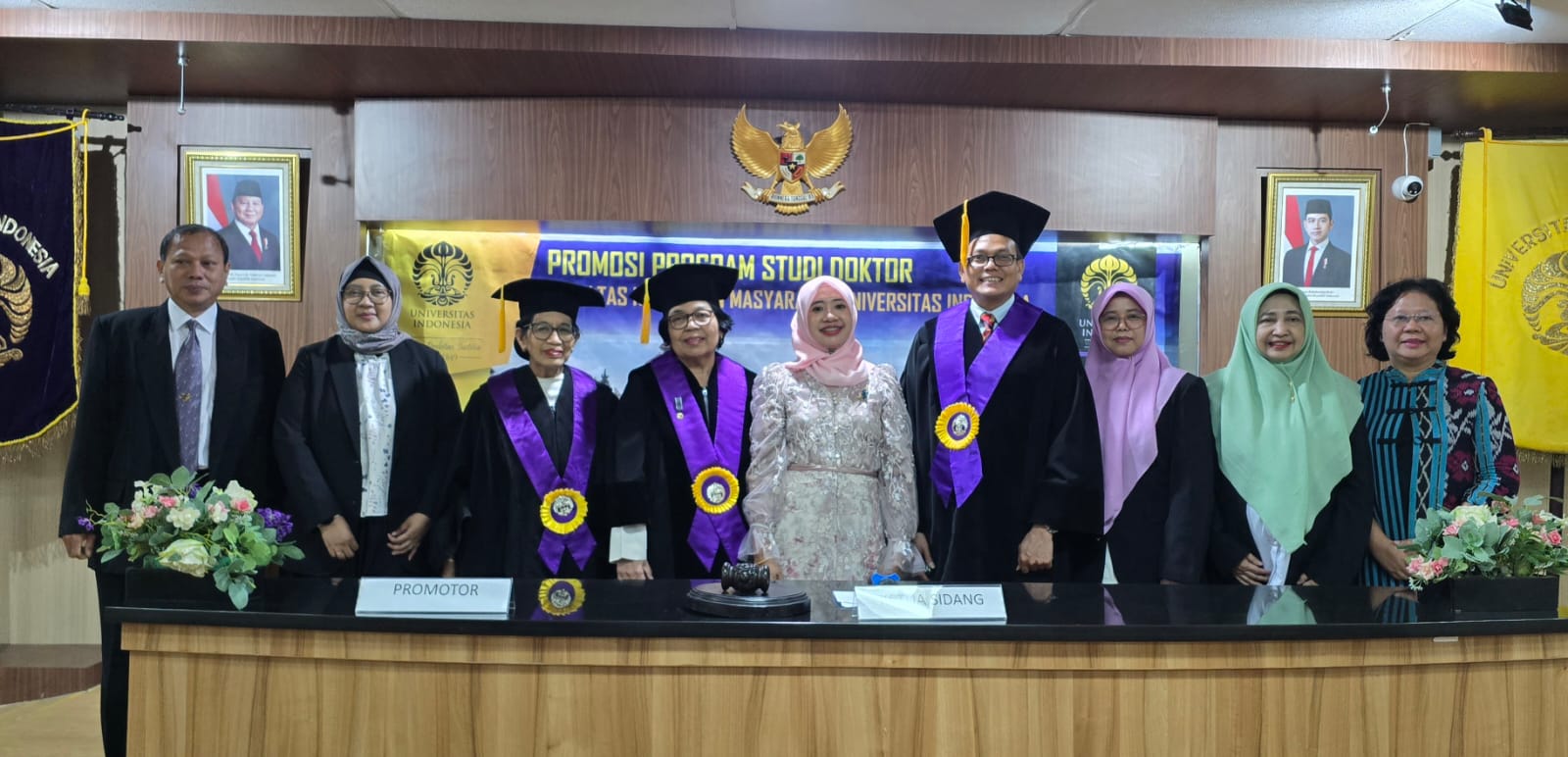On Friday, January 3, 2025, the Doctoral Program in Epidemiology, with a focus on Community Epidemiology, at the Faculty of Public Health (FPH) of the Universitas Indonesia (UI) held an Open Doctoral Promotion Session for Ika Dewi Subandiyah. The session was chaired by Prof. Dr. Besral, S.K.M., M.Sc., with Prof. drg. Nurhayati Adnan, M.P.H., M.Sc., Sc.D., as the Promoter, and Prof. Dr. dr. Ratna Djuwita Hatma, M.P.H., and Dr. dr. Nastiti Kaswandani, Sp.A(K), as Co-promoters. The examination committee included Dr. dr. Titis Prawitasari, SpA(K); Dr. Nining Mularsih, S.K.M., M.Epid.; Dr. drg. Siti Nuranisah, M.P.H.; and Dr. dr. Tri Yunis Miko Wahyono, M.Sc. Ika Dewi Subandiyah defended her dissertation titled “Vitamin D and Zinc Supplementation and Diet Counseling for Preventing Tuberculosis Infection in Children Under Five Who Are Household Contacts of Confirmed Pulmonary TB Cases in DKI Jakarta.”
Tuberculosis (TB) infection remains high in Indonesia, with the country ranking second in the world for the number of TB cases, 11% of which occur in children. Children under five who are household contacts of TB patients are at high risk for TB infection due to their weakened immune systems. Proper nutrition, both macro and micro, plays a crucial role in strengthening the immune systems of children. This study aimed to assess the effect of supplementation with vitamin D and zinc, along with diet counseling, in preventing TB infection in children under five who are household contacts of confirmed TB cases.
The research used a quasi-experimental method with children who were household contacts of confirmed pulmonary TB patients in 25 districts in the DKI Jakarta Province. A total of 260 children were sampled and divided into two groups: one group received interventions with vitamin D and zinc supplements and diet counseling, while the other group acted as the control. The intervention group received daily supplements with a dose of 400 IU/day of vitamin D and 10 mg/day of zinc for children under 12 months, and 600 IU/day of vitamin D and 20 mg/day of zinc for children aged 12-60 months. Diet counseling was provided monthly using a 24-hour recall method for the parents of the children.
TB infection is a condition where a child has been exposed to the TB bacteria and shows a response to fight the bacteria but has no symptoms of the disease. A tuberculin test was used to confirm TB infection in the children. If a child is infected with TB, there is a high probability that they will develop active TB. Therefore, preventing TB infection is essential.
The results of Ika Dewi Subandiyah’s research showed a 78% reduction in TB infection in children who received supplementation and counseling. The incidence of TB infection in the intervention group was 5%, compared to 23% in the control group. Supplementation with vitamin D and zinc increased the consumption of these nutrients, which are vital for immunity, such as enhancing T lymphocyte production, reducing inflammation, and improving the ability of cells to kill bacteria. Children who received the supplementation had an average vitamin D consumption of 14.9 mcg and zinc consumption of 18.2 mg. In contrast, children infected with TB had lower vitamin D and zinc intake than those who were not infected.
Based on these findings, Ika Dewi recommended that the Ministry of Health promote multicenter research to evaluate the effectiveness of vitamin D and zinc supplementation in preventing TB infection in children. She also suggested that the DKI Jakarta Health Office conduct a policy review to include vitamin D and zinc supplementation and diet counseling in TB infection prevention efforts in the region. Additionally, increasing the quality and quantity of contact investigations, which involve screening for TB in all household contacts of TB cases, is needed to identify the health status of contacts and ensure that anyone with TB receives treatment promptly. The government should also monitor the BCG vaccination for newborns and ensure that 100% of newborns are vaccinated.
Based on the results of her dissertation, Ika was officially awarded a Doctorate in Epidemiology. She is the first doctoral graduate in Epidemiology in 2025 and the 438th doctoral graduate from FPH UI. (Promovendus)

